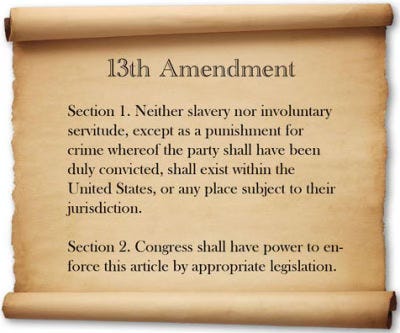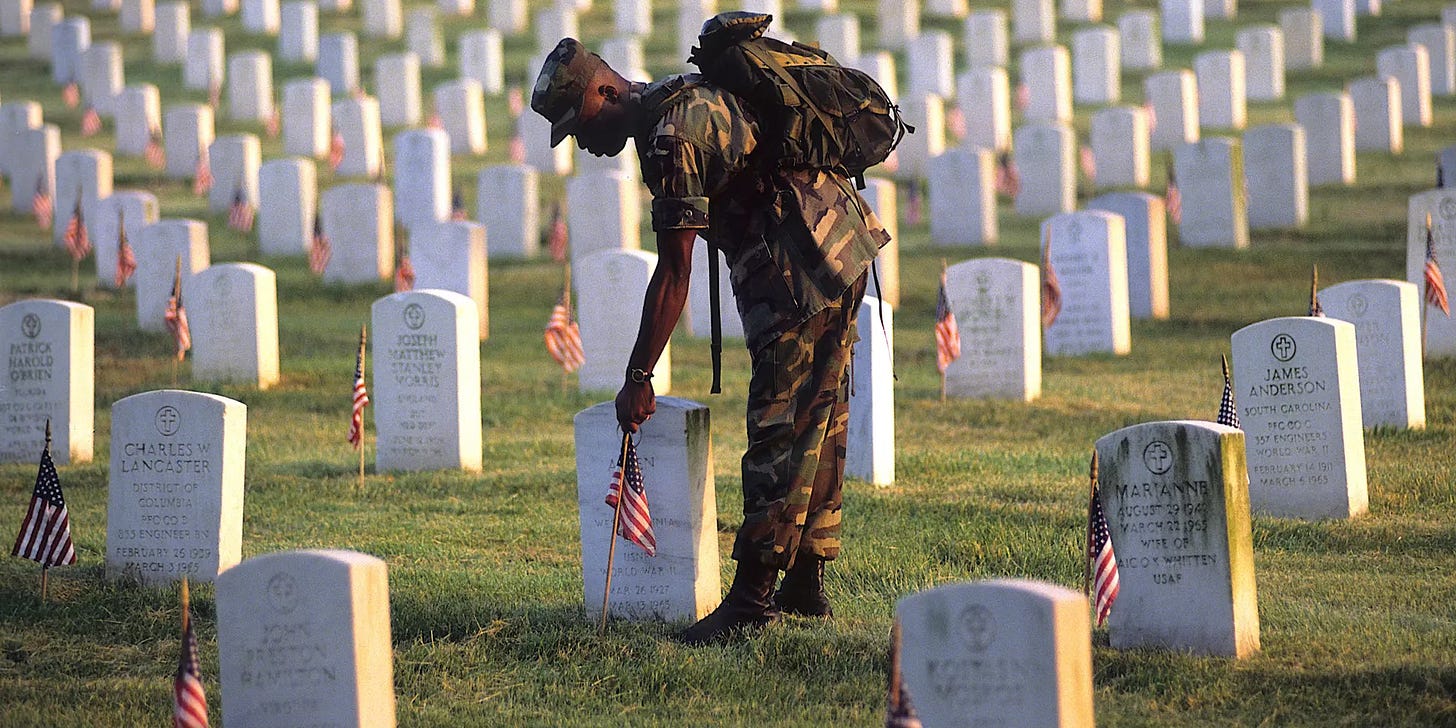Memorial Day
In the words of Abraham Lincoln: It is for us the living... to be dedicated here to the unfinished work which they who fought here have thus far so nobly advanced.
What is now officially Memorial Day used to be called Decoration Day, a uniquely American holiday born from the ashes of the America War.
The American Civil War raged from 1861 to 1865. The results included death, destruction, and devastation of every kind on scales that had never been witnessed before.
After the fires were put out and the dead were buried, veterans who survived the war and other citizens wanted to honor and express appreciation for their fellow citizens who had given “the last full measure of devotion,” in the memorable words Abraham Lincoln spoke at Gettysburg.
This included newly-freed former slaves, some of whom were freed by Lincoln’s Emancipation Proclamation, all of whom were freed by the 13th Amendment, what Lincoln referred to as the “king’s card,” a way to abolish slavery in the United States, permanently, without risk of some future Democratic President overturning or reversing it via mere Executive Order.
Having just escaped the horrific nightmare of legalized, government-protected human slavery, and experiencing freedom for the first time, newly-freed black men and women in the United States wanted to honor the soldiers who “gave their lives” so that this nation, “conceived in liberty and dedicated to the proposition that all men are created equal,” might live.
That’s why they, too, celebrated Decoration Day.
Ending legalized, government-protected human slavery in the United States was the “new birth of freedom” Lincoln summoned at the end of the Gettysburg Address.
If that newborn freedom ever fully grew, fully developed, fully matured, it would mean the full equal protection of the natural freedom and private property of each and every individual United States citizen regardless of skin color, sex, sexual preference, current income level, or any other incidental personal attribute.
It would mean a regime of liberty, not a regime of central planning, control, and command, where some must beg permission from masters and bureaucratic elites—a goal that seems farther away today than when Decoration Days were first observed in the late 1860s.
* * * * * * *
The first Decoration Day was held on May 30, 1868, at the request of General John A. Logan, a Union Army general and organizer of the Grand Army of the Republic (GAR), one of the oldest veterans organizations in the United States.
Decoration Day continued to be celebrated by Northern veterans and Northern citizens, including former slaves who were living freely in Northern states, for several decades, on May 30th of each year, until World War I.
Southerners during that time honored their own fallen Confederates on other dates and occasions, not May 30th.
After World War I, and then through the later wars—including World War II and Korea—Decoration Day slowly transformed into Memorial Day, still recognized each year, informally, on May 30, though it became more about honoring fallen soldiers from all American wars and conflicts, no longer limited to the Civil War.
In this later period, growing numbers of Southerners, too, started to recognize Memorial Day, rather than Decoration Day, each May 30th.
Finally, in 1968, Congress passed the Uniform Monday Holiday Act, which declared Memorial Day as a federal holiday, and established Memorial Day on the last Monday in May in order to create a three-day weekend for federal employees.
The first official modern Memorial Day in accord with federal law was in 1971.
Memorial Day, rooted in Decoration Day, is uniquely American because it points toward the unique American tragedy: Americans set for themselves a high moral standard, and they ended up fighting the bloodiest civil war up to that point in time because of that high moral standard.
Americans abolished slavery a mere two generations after founding a new nation. They made great efforts toward moral improvement, to reach the high standards of moral excellence set forth in the American Declaration of Independence.
Those efforts included Americans of different colors slaughtering each other in unprecedented and almost unimaginable numbers—all because some refused to live up to the high standards of moral excellence set forth in the American Declaration of Independence, preferring instead to mock those self-evident truths as “self-evident lies” and to fight viciously trying to defend the morally indefensible institution of slavery.
That is the American tragedy.
Memorial Day also highlights the fact that freedom is never free. Ever.
Freedom requires a vigilant defense, a willingness to stand against unjust, sometimes violent enemies. It is fitting that we honor those who gave their lives as well as those who risked their lives so that we might live freely.
These themes are precisely what President Lincoln spoke about in the brief remarks he delivered, in 1863, during the dedication ceremony for the newly-constructed cemetery at Gettysburg, Pennsylvania.
It is fitting to recall Lincoln’s words this Memorial Day, 2024. I reproduce them here, in full, with deep respect and gratefulness for all who gave the ultimate sacrifice for our nation. Even if these words seem familiar, please, pause for a moment and re-read them:
Four score and seven years ago our fathers brought forth on this continent, a new nation, conceived in Liberty, and dedicated to the proposition that all men are created equal.
Now we are engaged in a great civil war, testing whether that nation, or any nation so conceived and so dedicated, can long endure. We are met on a great battlefield of that war. We have come to dedicate a portion of that field, as a final resting place for those who here gave their lives that that nation might live. It is altogether fitting and proper that we should do this.
But, in a larger sense, we cannot dedicate—we cannot consecrate—we cannot hallow—this ground. The brave men, living and dead, who struggled here, have consecrated it, far above our poor power to add or detract. The world will little note, nor long remember what we say here, but it can never forget what they did here. It is for us the living, rather, to be dedicated here to the unfinished work which they who fought here have thus far so nobly advanced. It is rather for us to be here dedicated to the great task remaining before us—that from these honored dead we take increased devotion to that cause for which they gave the last full measure of devotion—that we here highly resolve that these dead shall not have died in vain—that this nation, under God, shall have a new birth of freedom—and that government of the people, by the people, for the people, shall not perish from the earth.






